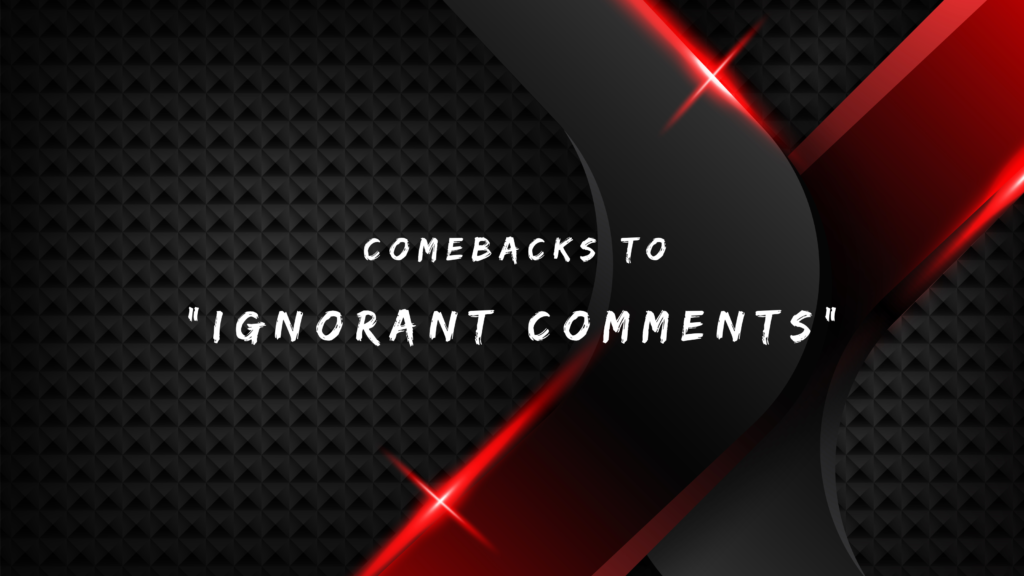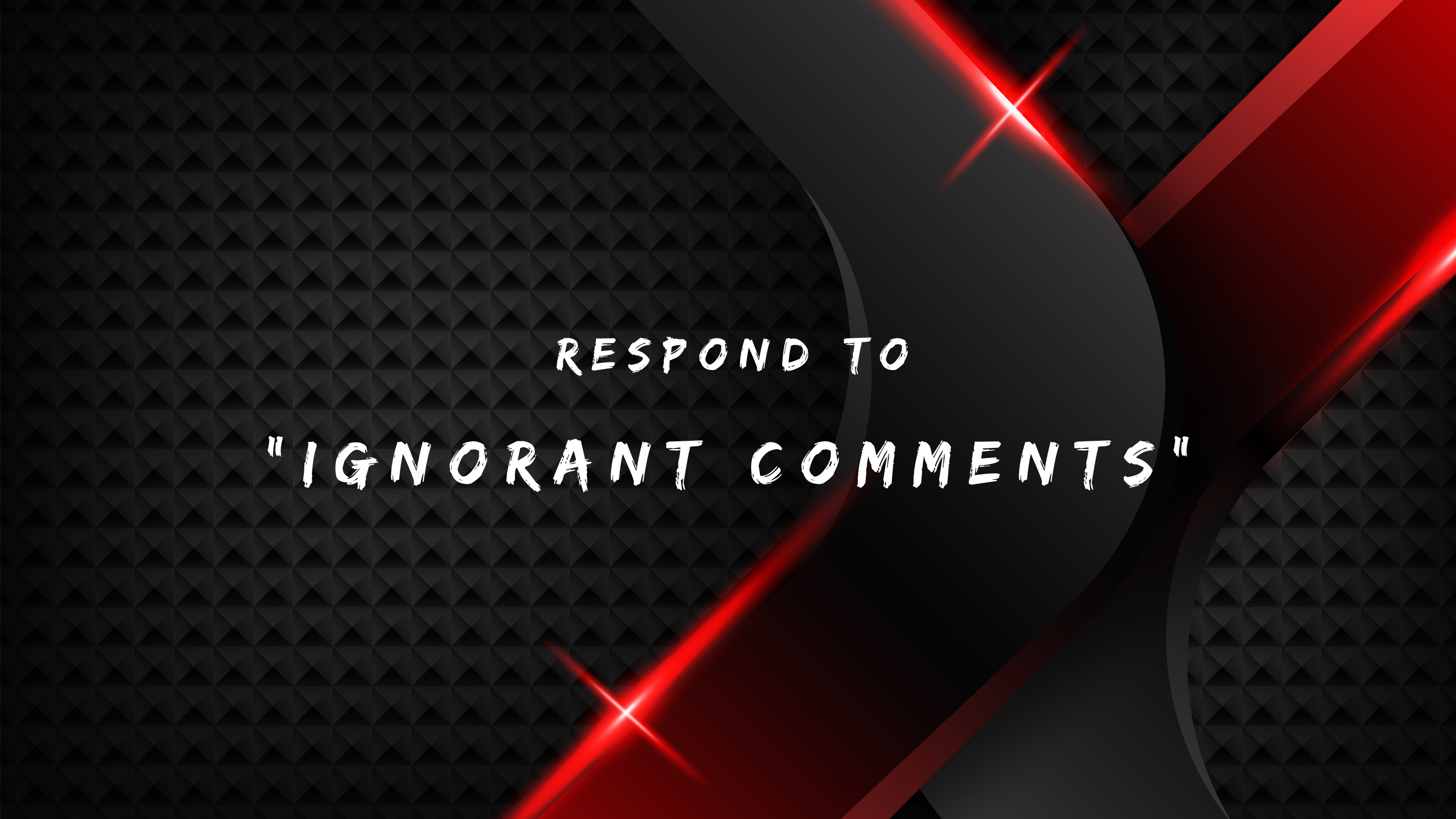We’ve all encountered ignorant comments at one point or another. Whether it’s a passing remark at work, an inappropriate statement from a friend, or something you’ve read online, ignorant comments can be frustrating. They often come from a misunderstanding or a lack of awareness, but that doesn’t mean you should let them slide. How you respond to these comments can speak volumes about your character and the respect you expect from others.
This article will explore practical and clever ways to respond to ignorant comments, from witty comebacks to thoughtful answers. You’ll learn to handle these situations gracefully, humorously, and confidently, ensuring your voice is heard without escalating tension.

150+ Comebacks to “Ignorant Comments”
Educational Comebacks
- Studies show the opposite of what you just said.
- Let me explain; there’s much more than just what I mentioned.
- That’s not entirely accurate; here’s the actual situation.
- According to recent research, your statement doesn’t hold up.
- You should check the facts before making such an assumption.
- That’s a common misconception, but here’s what happened.
- This topic has much more depth; let me summarize it for you.
- It’s a bit more nuanced than that; here’s why…
- I’d encourage you to look into some scholarly sources on that subject.
- What you need is the context surrounding this issue; let me elaborate.
Sarcastic Comebacks
- Oh, absolutely; I’m sure that’s how it works.
- Wow, I didn’t know you were an expert on everything.
- Yeah, because that makes so much sense, doesn’t it?
- Oh, of course! I’ll just throw all logic out the window, then.
- Right, who needs facts when we have your opinion?
- Well, thank goodness we have you here to clear all that up.
- Sure, because ignoring everything else is always the best option.
- Oh, grand, a new theory! I can’t wait to see how it holds up.
- I’ll go ahead and take that as the definitive answer. After all, who needs experts?
- That’s one way to look at it. A very unique way, I must say.
Humorous Comebacks
- If ignorance is bliss, you must be the happiest person alive.
- Are you writing a book on that topic? It’s so creative!
- Well, that’s one way to say it… and probably the wrong way!
- That’s a new one. Did you come up with that all by yourself?
- Consider a career in comedy with material like that!
- That’s an interesting take. Let me know if you want some help finding reality.
- I didn’t realize I was talking to the world’s leading expert.
- Are you sure you’re not confusing facts with fairy tales?
- I could retire early if I had a dollar for every time I heard that.
- I’ll pretend that makes sense for a second… and then forget it immediately.
Redirecting the Focus
- Let’s focus on the actual issue here, shall we?
- That’s an interesting tangent, but back to the original point…
- We can debate that later, but let’s stick to the topic for now.
- I’d love to talk about that, but it’s irrelevant.
- While that might be worth discussing, let’s return to the matter.
- I understand your point, but let’s keep the discussion on track.
- That’s an aside, but let’s return to our real issue.
- We can revisit that, but first, let’s wrap up this conversation.
- I think that’s a side note—let’s get back to the bigger picture.
- We’ll talk about that later. Right now, we need to address this topic.
Empathetic Comebacks
- I understand your origins are another perspective.
- I know this message, but here’s what’s happening.
- You may not know all the details here, but let me help clarify.
- You might think that, but there’s more to it.
- That might seem true at first glance, but let’s dig deeper.
- This is a tricky concept, but here’s a breakdown of facts breakdown alone in thinking that, but there’s a better understanding I can share.
- I can see how you arrived at that conclusion, but here’s a complete picture.
- I appreciate your view, but let me show you some information you’re missing.
- It’s okay not to know everything, but let me help fill the gaps.
Assertive Comebacks
- That’s not true, and I won’t let that misconception slide.
- I’m going to stop you right there because that’s inaccurate.
- That’s not how it works, and here’s why…
- I’m confident that’s not the case. Let me explain why.
- I disagree with that, and here’s why it doesn’t make sense.
- I’m going to have to correct you on that one.
- That’s simply not incorrect, and I think it must be the facts that get straight.
- You’re mistaken, and I won’t allow this to be misrepresented.
- That’s a misinterpretation of the facts, and I’ll tell you why.
- I’m sure you didn’t mean it that way, but that’s inaccurate.
Rhetorical Questions
- How did you come to that conclusion? I’m curious.
- Is that really how you see it, or is there another side to the story?
- Why would anyone think that’s the case when the facts say otherwise?
- Where did you hear that? I’d love to know the source.
- Do you believe that’s true, or are we just guessing here?
- What makes you think that’s the right way to approach this?
- How does that fit with what we know to be true?
- Have you considered the other perspective on this?
- How does that explain all the conflicting evidence we have?
- Are we going to ignore the bigger picture here?
Condescending Comebacks
- Oh, bless your heart. That’s not quite right.
- It’s cute that you think that, but here’s the reality.
- It’s okay; not everyone has all the facts. Let me help you out.
- You’re trying, but that’s a little off the mark.
- I’m sure you mean well, but that’s far from the truth.
- I didn’t realize I was talking to an expert in everything!
- That makes sense in your world, but it’s not how things work here.
- Oh, that’s an interesting theory, but let me correct you.
- I can see how you’d think that, but let’s be honest here.
- I love your enthusiasm, but that’s not how it works.
Deflection by Agreement (Irony)
- Yeah, and while we’re at it, let’s say the Earth is flat too!
- Oh, sure, and next, you’ll tell me unicorns exist.
- Right, that’s the case, just like how pigs can fly.
- Just likJustw everereotype is 100% accurate.
- I’ll believe that right after hearing about the Loch Ness Monster.
- While we agree, let’s talk about how gravity doesn’t exist.
- Oh, for sure, and the moon landing was staged!
- I agree; let’s ignore all the facts and go witapplytheory.
- That makes perfect sense, just like how every conspiracy theory is true.
- Oh, of course, and let’s also pretend history didn’t happen.
Informational Comebacks
- The facts tell a completely different story.
- The research on this is clear, and here’s what it says…
- Let me give you some more accurate information on this topic.
- The statistics show that’s not the case.
- You’ll see a different picture if you look at the data from [insert study or source].
- The latest report shows [insert fact].
- Here’s a breakdown of the situation based on the most recent information.
- That’s an oversimplification; the full explanation is much more complex.
- If we look at the facts objectively, this is what we find…
- According to experts in the field, that’s not how it works.
Historical Perspective
- Looking back in history, you’ll see that’s been disproven already.
- This perspective was widely accepted in the past, but it’s been debunked over time.
- Historically, that idea didn’t hold up, and here’s why…
- That might have been true in the 1800s, but not anymore.
- This has been a long-debated issue, and the historical evidence contradicts your point.
- History shows that this approach has failed before.
- Looking at how things unfolded in the past, you’ll see the opposite happened.
- This idea was debunked back in [insert year] by [insert historical figure].
- Many experts have disproven this view for years now.
- This issue was addressed in [insert historical event], and the outcome differed.
Personal Experience
- From my experience, I can tell you that’s not how it works.
- I’ve been through something similar, and here’s what happens.
- In my own life, I’ve seen this play out very differently.
- Having worked in this field, I can assure you that’s not the case.
- From what I’ve experienced firsthand, that’s not how it went down.
- I can speak from personal experience when this is inaccurate.
- In my own experience, the situation is much more complicated than that.
- Based on what I’ve encountered, this is what happens.
- I’ve dealt with this before, and it wasn’t anything like what you described.
- Having gone through this, I can tell you it’s a little more complex.
Disarming Silence
- Silence, just a stare (Let the awkward silence speak for itself.)
- No words, just a raised eyebrow (Let the discomfort settle in.)
- A long pause, followed by a shrug (You don’t need to respond.)
- Stare blankly for a few seconds, then walk away (Sometimes silence is the most potent response.)
- No response, just a sigh (Indicating that the comment isn’t worth responding to.)
- A brief pause followed by an exaggerated, slow blink (Letting them process the awkwardness.)
- Nod slowly with no further comment (Letting the statement sink in.)
- Quietly shake your head and walk away (A subtle way of showing disapproval.)
- Stay silent and wait for the other person to realize the flaw in their statement.
- Just look at them with an unamused expression, then say nothing (Non-verbal communication can be just as powerful.)
Redirecting to Accountability
- Where did you hear that? I’d like to see the sources for that claim.
- Can you back that up with any evidence or research?
- I’d be interested to hear where you got that information from.
- Can you explain why you believe that to be true? I’m not following.
- That’s a bold claim. Can you provide some proof or details to support it?
- I’m curious: what’s the source behind your statement?
- Can you show me the study or article that says that?
- We need to fact-check that. Can you provide a reference?
- Who said that, and what was their reasoning?
- I’m not sure I agree. Can you explain where that conclusion comes from?
Empowering Comebacks
- It’s essential to stay open to learning new perspectives; that’s how we grow.
- I’d encourage you to explore this further; it’ll be fascinating once you dig deeper.
- It’s great that you’re asking questions, but maybe it’s time to consider other viewpoints.
- I understand that’s your perspective, but it’s always good to challenge our assumptions.
- This might not be easy to accept, but growth often happens when we confront our misconceptions.
- Considering new information is empowering, and I encourage you to do so here.
- We all make mistakes, but how do we learn from them? I’m happy to help you see things from a different perspective.
- We should all strive to keep learning and evolving, and I’m happy to be part of that process.
- It’s empowering to challenge what we think we know. Let’s explore this idea further.
What Makes a Comment “Ignorant”?
An ignorant comment shows a lack of awareness or understanding. It can be unintentionally hurtful or completely off-base, but it often stems from ignorance rather than malice. A person who makes an ignorant comment might not have all the facts, may lack sensitivity to specific issues, or might be expressing something they don’t fully understand.
For example, comments about someone’s appearance, race, gender, or personal choices that are based on stereotypes or generalizations are often considered ignorant. These remarks are typically made without the speaker realizing their words’ broader context or impact.
- Examples of Ignorant Comments
“Why don’t you just get over it?” (dismissive of someone’s trauma or struggles)
“All men are the same.” (broad, unfair generalization)
“I don’t see color.” (ignoring someone’s racial or cultural experience)
“You should just smile more.” (reducing someone’s worth to a stereotype)
These are just a few examples of ignorant comments, but the possibilities are endless. The critical thing to remember is that, while they may be frustrating, responding correctly can shift the conversation.
Why People Make Ignorant Comments
- Lack of Awareness
Often, ignorant comments are made due to a simple lack of awareness. The person remarking might need to realize how their words affect others. For example, they may need help understanding the significance of specific cultural symbols or the weight of certain stereotypes. These comments are more about ignorance than ill intent, and sometimes, offering a bit of education can help.
- Intentional Provocation
Some people, however, make ignorant comments on purpose. They may want to provoke a reaction or push your buttons. In these cases, responding with a witty comeback or staying calm and composed can show that you’re not easily rattled by their attempts to get under your skin.
- Ignorance or Misunderstanding
Other times, ignorance comes from misunderstanding something or being misinformed. People genuinely trying to communicate but don’t have all the facts may make statements that seem thoughtless or out of touch. A calm and explanatory response could help clear up the confusion in these cases.
The Importance of Responding to Ignorant Comments
- Protecting Your Boundaries
One of the primary reasons to respond to ignorant comments is to protect your boundaries. Letting people make uninformed or disrespectful remarks without addressing them can lead to negativity and disrespect. Speaking up lets others know that you expect better from them and that their words matter.
- Educating Others
Sometimes, ignorant comments come from a place of genuine misunderstanding. By responding thoughtfully, you can help educate the other person and broaden their perspective. Responding with facts and compassion can have a lasting impact in these situations.
- Preserving Your Peace
At the same time, you should choose your battles. Not every ignorant comment requires a response. Sometimes, the best course of action is to let it go, especially if engaging will only worsen the situation. Be about preserving your peace and dignity, not feeding into unnecessary conflict.
Sarcastic Comebacks
Sarcasm can be a great way to highlight the absurdity of an ignorant comment, especially if the comment is particularly ridiculous. A well-placed sarcastic remark can be an effective way to respond without escalating the situation too much.
- How to Use Sarcasm Effectively
Keep it lighthearted: Sarcasm should be used to point out the ridiculousness of the comment, not to escalate things.
Be mindful of tone: The right tone can make a sarcastic comment humorous rather than hostile.
- Examples of Sarcastic Comebacks
“Oh, I’m sure you’re an expert on that, right?”
“Well, that was a groundbreaking thought. I’ll be sure to write it down.”
“Yeah, because everyone knows everything about me after a five-minute conversation.”
Thoughtful and Calm Responses
Not all ignorant comments need to be met with sarcasm. Sometimes, the best response is a calm and thoughtful one. This is especially true when the person seems open to understanding or when you want to correct misinformation respectfully.
- How to Stay Calm and Composed
Take a deep breath before responding.
Avoid becoming defensive or combative.
Focus on respectfully explaining your point of view.
- Examples of Thoughtful Responses
“I understand where you’re coming from, but here’s another perspective.”
“Actually, that’s not quite accurate. Let me clarify.”
“I think we might have different experiences, and I’d love to share mine with you.”
Humorous Retorts
Humor can be a powerful tool for diffusing tension and making a point without sounding aggressive. When you respond with humor, you can disarm the person making the ignorant comment while also keeping the mood light.
- Funny Comebacks to Ignorant Comments
“Wow, if ignorance were a superpower, you’d be a superhero.”
“I think you’ve just invented a whole new level of cluelessness!”
“Well, that’s one way to look at it, but I’m going to go with the facts instead.”
Turning the Tables
Another strategy is to turn the conversation around on the person who made the ignorant comment. By asking questions or requesting clarification, you can make them reflect on their words without directly attacking them.
- Examples of Turning the Tables on Ignorance
“What makes you say that?”
“I’d love to hear more about your reasoning behind that.”
“Interesting viewpoint—can you tell me why you think that’s true?”
- The Silent Treatment
Sometimes, the most potent response is no response at all. Ignoring ignorance can be a way to show that you’re not willing to engage in disrespectful or fruitless conversations.
- When Silence is the Best Response
When the comment is too ridiculous to engage with.
When engaging will only escalate the situation.
When the person commenting isn’t someone you want to invest energy in.
How to Choose the Right Comeback
Choosing the proper comeback depends on the context. Here are a few tips to help you decide how to respond:
- Assessing the Situation
Consider the intent behind the comment. Is it malicious, or is it simply a misunderstanding?
Think about the setting. A social media comment might call for a different response than a remark made in a professional setting.
- Considering Your Own Emotions
Are you emotionally charged? Sometimes, it’s better to step back and cool down before responding.
If you’re upset, consider whether it’s worth responding right away or reflecting before crafting a reply.
- Picking Your Battles
Not every ignorant comment is worth your energy. Sometimes, it’s okay just to let it slide, especially if engaging only worsens the situation.
Conclusion
In conclusion, handling ignorant comments with confidence and wit is a powerful skill. Whether you respond with humor, sarcasm, or assertiveness, having a solid comeback ready can make all the difference in maintaining your composure. The 150+ epic comebacks shared in this blog are just the beginning—use them to turn uncomfortable situations into opportunities for strength and self-expression. If you’re looking for even more ways to navigate tricky conversations, check out our guide on Instant “Don’t Know What You Mean” – 150+ Comebacks Here to keep your comeback game strong!
FAQs
Q. What is an ignorant comment?
An ignorant comment is made without understanding or considering the subject matter. It’s often based on misconceptions or stereotypes.
Q. Should I respond to every ignorant comment?
Not necessarily. Sometimes, ignoring the comment or walking away is the best option, especially if engaging would only lead to further conflict.
Q. How can I tell if a comment is ignorant or just a mistake?
If the comment is based on stereotypes and misinformation or dismisses others’ experiences, it’s likely ignorant. It may be a misunderstanding if the person seems open to learning.
Q. What if the person making the ignorant comment refuses to listen?
Sometimes, the person may not be open to changing their perspective. In these situations, you can either educate them or simply walk away.
Q. How can I stay calm when responding to an ignorant comment?
Taking a deep breath, staying grounded in your feelings, and choosing your words carefully will help keep you composed. It’s important to remain respectful and avoid reacting impulsively.











Noodlemagazine You’re so awesome! I don’t believe I have read a single thing like that before. So great to find someone with some original thoughts on this topic. Really.. thank you for starting this up. This website is something that is needed on the internet, someone with a little originality!
Glue Dream strain Pretty! This has been a really wonderful post. Many thanks for providing these details.